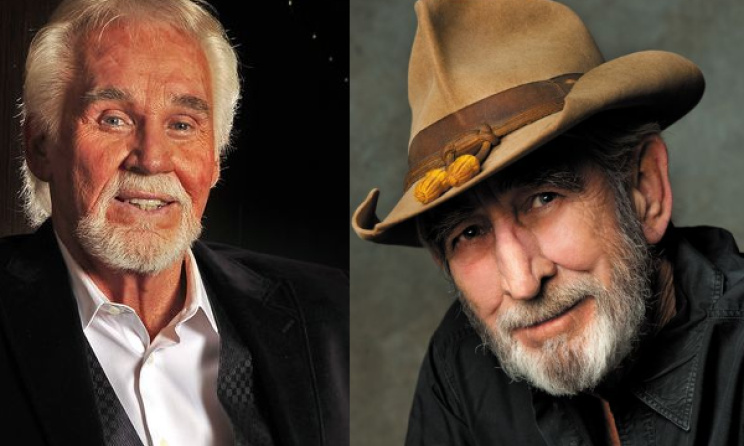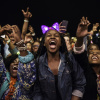Going country: Nashville lives in Nigeria
By Oris Aigbokhaevbolo
Sometime between folk singer Don McLean popularising the phrase ‘the day the music died’ in 1971’s ‘American Pie’ and Madonna’s iteration of the song in 2000, country music died on Nigerian radio.
 Kenny Rogers and Don Willaims
Kenny Rogers and Don Willaims
To be sure, the US retains prime position as culture exporter. The world listened when hip-hop ascended to dominance - Nigerian teenagers tied bandannas on their heads in the style of Tupac and threw up American gang signs - and hitherto learned the moonwalk. That fascination with American pop culture continues. To take a recent example, many Nigerians, going by social media updates, mourned Joan Rivers probably as much as Chris Rock. Make it in the US and you’ve made it Nigeria.
That is, unless you are today’s country star.
Meaningful sounds
The Billboard Country Chart from the second week of September 2014 lists such names as Jason Aldean, Florida Georgia Line, Sam Hunt, Dierks Bentley, Luke Bryan, Cole Swindell. Who? What? In the age of the internet and instant music acquisition, this disconnection is uncanny. What happened?
“People don’t listen to meaningful songs, they listen to meaningful sounds,” Peter Kundum of Cool FM in Abuja tells me. “It boils down to the quest for urban contemporary music. Nigerians, Africans are beginning to unlink themselves from what America dictates. People are beginning to relate with what we have. The same thing has happened with movies. We are in the jet age, and people want things that move really fast. Country music is a little too laid-back. Even Taylor Swift sings pop now.”
He has a point. Taylor Swift, darling of country music, has inched towards pop with every album. Compare ‘Tears on my Guitar’ or ‘Tim McGraw’ with ‘We Are Never Getting Back Together’ (2013) or ‘Shake it Off’ (2014).
“Jos is the home of country music”
As Taylor parts with her root genre, can it be surprising that big cities Lagos and Abuja are doing the same? Kundum’s theory on the fast-paced demands on music suggests that country music may thrive in a town less driven than the commercial and official pair. Turns out he is right. While country music airplay has dwindled on Lagos and Abuja radio, interest in the genre has remained high in many middle-belt states, especially Plateau State.
One of the state’s stations, Peace FM in Jos, has hosted a two-hour programme ‘Best of Country’ since 1988. Before leaving to pursue other interests, the penultimate host of the programme, Steve Rwang Pam, presented the programme for nine of those 26 years. “Jos is the home of country music, pretty much like Nashville, Tennessee,” he says. “The genre has a large following among young people today, and there are more than 12 tertiary institutions or so within the reach of the frequency of Peace FM. I had youngsters sending me text messages 48 hours in advance of my show. I had listeners from more than four neighbouring states.”
Rwang Pam’s successor on 'Best of Country', Petra Jimwan, was more sceptical of country music’s current status: “It is small when you compare it with the massive percentage of popular music lovers like hip-hop or Naija pop.”
Given this disparity, does country have a place in modern Nigeria? “I think it has a place,” Jimwan says. “I say so because there are a select few of our young people today that have broad tastes and are unsatisfied with the musical content churned out by a lot of our musicians today. You’d bear witness to the fact that as far as lyrics are concerned, quality has declined compared to the 1960s, 70s and 80s; even in the early 90s it was a bit decent and made sense. The songs now are just a jungle of rhymes and arrangements that hardly makes any sense. Today we have great beats but no content, except for very few artists. Now this set of young people explores other musical genres for good lyricism and quality songs that aptly express the contemporary frustrations of modern man - like reggae, country, soul and folk songs. So I’ll say that country music is not dead, nor dying. It is not a musical taste of old folks."
The highest compliment a fan can pay a genre is learning to play and perform its songs - and Jos has proved a wondrously eclectic supplier of music fans turned practitioners: rappers MI, Ice Prince and Jesse Jagz as well as R&B duo P-Square grew up in Jos. The town has also delivered to the nation Panam Percy Paul, a country gospel singer famous in the 1990s.
The radio host Rwang Pam, who is also an acclaimed country singer, left Peace FM in part to work on his sophomore album. He tells me how he became a fan: “Back when I was a kid, company marketers from Lever Brothers used to come once in a while at night in their Volkswagen buses to play western movies using a projector. I was also watching the TV series 'The Wild Wild West' and after that was another TV series, ‘Gunsmoke’. Later I got to see some albums with pictures of artists dressed as the cowboys I watched on TV. It was easy for me to relate with the music on the LP because I was already in love with the cowboy life and dressing. So I was keen about what the music could tell me - and it turned out just right. Dolly Parton’s ‘Detroit City’ was the one song I heard which made me appreciate radio listening. Through it I began to see the radio as a living pet and not as a sound-producing machine.”
How did country spread to the rest of Nigeria?
Impossible as it is to prove, Rwang Pam has a plausible hypothesis on how Jos became the home of country music: “Jos was one of the earliest mining spots in Africa and I am sure foreign miners brought their form of entertainment and leisure, which helped spread the genre in Nigeria.”
The countrywide spread of the genre is, however, mostly down to Don Williams, who is probably the most popular of the country music artists known to Nigerians. In the 1970s, EMI, Don Williams’ marketing outfit, had a station in Nigeria and made his music available. Nigerians who travelled overseas brought back country music records. Emma Ogosi, famous for discovering reggae singer Evi Edna Ogoli, played and contributed to the promotion of country music in the 1980s. Ogosi also produced Bongos Ikwue.
Contemporary spread of the genre seems to be down to the men from Jos. Rwang Pam tells me he’ll head to Lagos soon for reconnaissance. John Kutcheti, an older 'Best of Country' alumni, now performs and hosts ‘Glory Country’, a country music show in Bayelsa state. Kutcheti, nicknamed 'The African Don Williams' for his similar timbre, corroborates the too-laidback-for-jet-age claim: “Most people on the fast lane cannot understand country music. It is message-based music and most don’t listen. They listen to what is trending.”
Surely it is not entirely the fault of the audience - what about the artists? “A lot of musicians here are not serious,” says Kutcheti. “They just put their voice on a sound. You can’t do that with country music because it is best appreciated live.”
Playing country music live has seen Kutcheti perform for (former) President Jonathan and former Head of State Yakubu Gowon - the former possibly reliving easier days and the latter reflecting on glory days. On his show 'Glory Country', listeners often request Brad Paisley’s ‘Those Crazy Christians’, Kenny Rogers’ ‘The Gambler’ and, of course, Don Williams’ ‘Amanda’.
"I don’t see it as white music”
Asked how it is that a genre generally played by white America came to be accepted here in Nigeria, Rwang Pam and Kutcheti disagree with the premise of the question. Says Rwang Pam: “I don’t see country music as white American music but rather as an American genre. I’d like to quote the black legend Charlie Pride, who was inducted in the Country Music Hall of Fame as he was quitting the professional baseball game. I read about him speaking to his coach, saying something like, ‘I am quitting baseball not for white man’s music but as an American doing American music'.”
Rwang Pam then proceeds to list contributions of Black America to country music. Darius Rucker (formerly of Hootie & the Blowfish) released a country album, as did ancient R&B heartthrob Lionel Richie who, back in the day, produced about a dozen Kenny Rogers’ tracks. Michael Jackson lent backing vocals to Rogers’ ‘Going Back to Alabama’, and both Aaron Neville and Ray Charles performed country music. “Folk music is white music,” says Pam. “But country music is the fusion of folk and the blues. The lyrics and the way the instruments are used are all wrapped up in feelings. Don Williams said about country music and the blues, that ‘they are kids and cousins.’”
Kutcheti speaks about country music’s African influences. Apparently the banjo, a prominent instrument in country music, is similar to the Gurmi, a musical instrument common in Northern Nigerian. “Africans started played it in [America] and they [Americans] modified it.”
He never says, but the idea as it occurs to me is this: how can you copy what is partly yours anyway?
First published on 19 September 2014 on This Is Africa.



















Commentaires
s'identifier or register to post comments